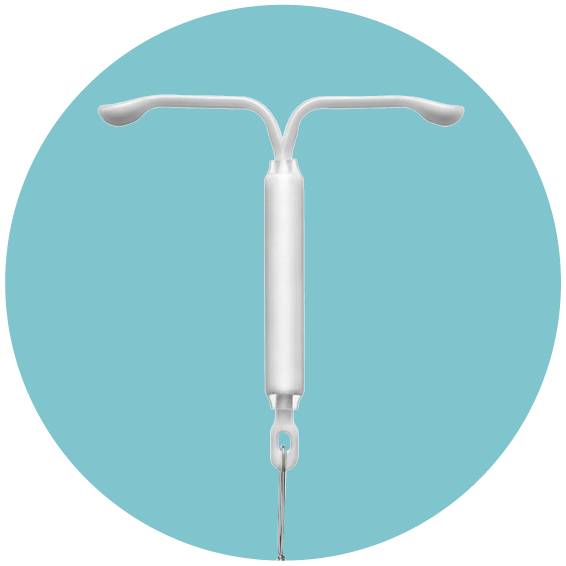FE | Risk Minimisation Patient
Title
LNG-IUS is the most commonly used method by most HCPs involved in contraceptive counselling.5
HCP – healthcare professional; IUS – intrauterine system; LNG-IUS – levonorgestrel-releasing intrauterine system
- Addendum to the Clinical overview – Mirena® BAY86-5028 (Levonorgestrel intrauterine delivery system) No. 4.0. Date of report: APR 2021. Return to content
- Gemzell-Danielson K, Kubba A, Caetano C et al. Acta Obstet Gynecol Scand 2021. DOI: 10.1111/aogs.14110 [online ahead of print]. Return to content
- Gemzell-Danielson K, Kubba A, Caetano C et al. BMJ Sex Reprod Health 2021. DOI: 10.1136/bmjsrh-2020-200962 [online ahead of print]. Return to content
- PubMed. Search results for ‘Mirena’. Available at: https://pubmed.ncbi.nlm.nih.gov/?term=mirena [Accessed February 2021]. Return to content
- Gemzell-Danielson K, Cho S, Inki P et al. Contraception 2012;86(6):631–638. Return to content
Title

Mirena® may be the right choice for women who are looking for highly-effective contraception1
- Mirena® Summary of Product Characteristics. Return to content
- World Health Organization (WHO). Medical eligibility for contraceptive use (5th edition). Available at: https://apps.who.int/iris/bitstream/handle/10665/181468/9789241549158_eng.pdf [Accessed February 2021]. Return to content
Title
Mirena® targets the endometrium directly by locally releasing LNG1

Mirena® may be a suitable option for women who are concerned about systemic hormone exposure
LNG – levonorgestrel
- Mirena® Summary of Product Characteristics. Return to content
Title
Mirena® meets the needs of women who desire a more controlled bleeding pattern*1,2
According to a study enrolling 325 women aged 15–57 years old:†1
- 80% would prefer their periods to be less painful, shorter or lighter, or to stop completely*1
After one year of Mirena® use:
Mirena® provides additional benefits to women looking for shorter, lighter periods, or freedom from bleeding entirely‡2

Ask your patients if their menstrual blood flow has been negatively impacting their social lives
‡ Compared to their current menstrual bleeding pattern.
- Den Tonkelaar I and Oddens BJ. Contraception 1999;59(6):357–362. Return to content
- Rana M, Saxena O and Firdous N. Eur Rev Med Pharmacol Sci 2012;16(2):230–234. Return to content
Title
Mirena® is associated with significantly higher continuation and satisfaction rates compared to OCs*1
|
|
Mirena® |
OCs |
|---|---|---|
|
|
88% |
55% |
|
|
86% |
54% |
Discuss Mirena® with your patients who are unsatisfied with their current contraceptive
OC – oral contraceptive
- Peipert JF, Zhao Q, Allsworth JE et al. Obstet Gynecol 2011;117(5):1105–1113. Return to content
Title
Upon removal of Mirena®, women return to their normal fertility1

Reassure your patients that they should expect a rapid return to fertility after removal of Mirena®1
- Mirena® Summary of Product Characteristics. Return to content
- Mansour D. Contraception 2012;85(3):224–234. Return to content
Title
Providing new moms with the contraception they need
Discuss the benefits of Mirena® with your patients who have recently given birth
IUD – intrauterine device; LNG-IUS – levonorgestrel-releasing intrauterine system; WHO – World Health Organization
- Cwiak C, Gellasch T and Zieman M et al. Contraception 2004;70:383–386. Return to content
- Mirena® Summary of Product Characteristics. Return to content
- World Health Organization (WHO). Medical eligibility for contraceptive use (5th edition). Available at: https://apps.who.int/iris/bitstream/handle/10665/181468/9789241549158_eng.pdf [Accessed February 2021]. Return to content
- Shaamash AH, Sayed GH, Hussien MM et al. Contraception 2005;72(5):346–351. Return to content
Title
Mirena®: Frequently asked questions
Below you will find answers to some commonly asked questions about Mirena®. These will support you when assessing appropriate contraceptive options for women in your clinical practice.
Mirena® is a long-acting reversible contraceptive method that can be particularly useful in women with heavy menstrual bleeding.1
- Mirena® Summary of Product Characteristics. Return to content
Mirena® is indicated for contraceptive use for up to 6 years and as a treatment option for menorrhagia for up to 5 years.1
If a woman wishes to continue using the same method, Mirena® can be replaced by a new system at the same time of the removal.1
- Mirena® Summary of Product Characteristics. Return to content
Undesirable effects are more common during the first months after the insertion of Mirena® and subside during prolonged use. Common side effects of Mirena® (occurring in less than 1 in 10 women), include:1
- Depressed mood/depression
- Nervousness
- Decreased libido
- Headache
- Dizziness
- Abdominal pain
- Nausea
- Acne
- Back pain
- Pelvic pain
- Dysmenorrhea
- Vaginal discharge
- Vulvovaginitis
- Breast tenderness
- Breast pain
- Intra-uterine contraceptive expelled
- Weight increase
Very common undesirable effects (occurring in more than 10% of users) include uterine/vaginal bleeding – spotting, oligomenorrhea, amenorrhea and benign cysts.1
For a full list of potential side effects, refer to the Summary of Product Characteristics. If a woman does experience side effects, she should speak to a doctor, pharmacist or nurse. This includes any possible side effects not listed in the contraception package leaflet.
- Mirena® Summary of Product Characteristics. Return to content
Weight gain has been reported as common in women fitted with Mirena® (occurring in more than 1 in 100 and less than 1 in 10 women). However, a causal link between Mirena® use and weight gain has not been established and requires further investigation.1
- Mirena® Summary of Product Characteristics. Return to content
Depression has been reported in fewer than 1 in 10 women fitted with Mirena®.1
There is no clear data to establish whether there is an increased risk of suicidal thoughts and behaviour associated with the use of hormonal contraceptives. Depressed mood and depression are well-known undesirable effects of hormonal contraceptive use. Depression can be serious and is a well-known risk factor for suicidal behaviour and suicide. Women should be advised to contact their doctor in case of mood changes and depressive symptoms, including shortly after initiating the treatment.2
- Mirena® Summary of Product Characteristics. Return to content
- European Medicines Agency. PRAC assessment on the use of combined hormonal contraception and suicidality [online]. Available at: https://www.ema.europa.eu/en/documents/prac-recommendation/prac-recommendations-signals-adopted-1-4-october-2018-prac-meeting_en.pdf [Last accessed February 2021]. Return to content
Mirena® is known to affect women’s menstrual cycles.1 Women fitted with Mirena® may experience lighter bleeding or some spotting (light bleeding in between periods) and irregular bleeding during the first 3–6 months after placement.2 Some women may have prolonged or heavy bleeding or an increase in the frequency of bleeding, usually in the first 2–3 months, before a reduction in blood loss is achieved.2 However, overall, women are likely to have fewer days of bleeding each month and may eventually have no periods at all. This is due to the effect of levonorgestrel on the lining of the womb.2
For women with menorrhagia, Mirena® usually results in lighter periods and can decrease blood loss by up to 90% at Cycle 3 and 96% at Cycle 6.1
- Reid PC and Virtanen-Kari S. BJOG 2005;112(8):1121–1125. Return to content
- Mirena® Summary of Product Characteristics. Return to content
Fertility is immediately restored, so conception can occur from the first cycle following removal of Mirena®.1 Studies have suggested that, in women who discontinue Mirena® for planned pregnancy, 80% become pregnant within one year.2
- Andersson K, Batar I and Rybo G. Contraception 1992;46(6):575–584. Return to content
- Mirena® Summary of Product Characteristics. Return to content
If a woman becomes pregnant while Mirena® is in place, ectopic pregnancy should be excluded, the system must be removed and termination of the pregnancy should be considered. Accordingly, removal of Mirena® or probing of the uterus may also result in spontaneous miscarriage.1
If a woman wishes to continue the pregnancy and the system cannot be withdrawn, she should be informed about the increased risks and the possible consequences of premature birth to the infant. Such pregnancies should be closely monitored. The woman should be instructed to report all symptoms that suggest complications of the pregnancy, like cramping abdominal pain with fever.1
For more information and a complete list of contraindications, refer to the Mirena® Summary of Product Characteristics.
- Mirena® Summary of Product Characteristics. Return to content











